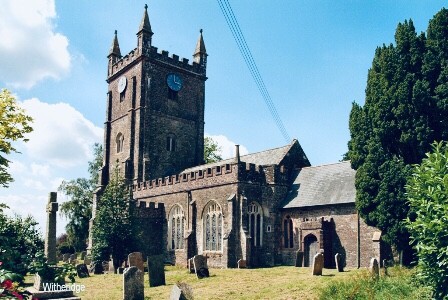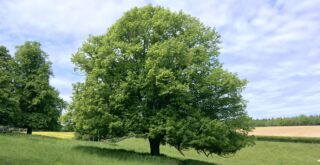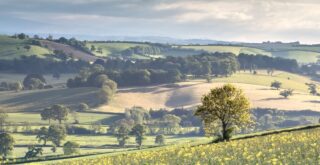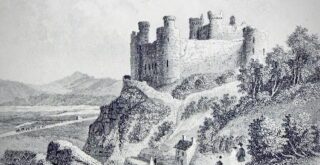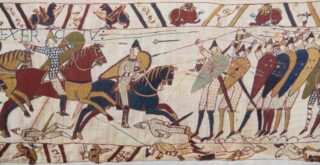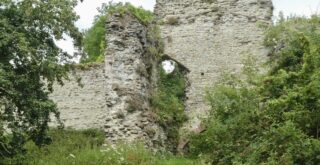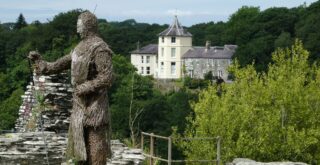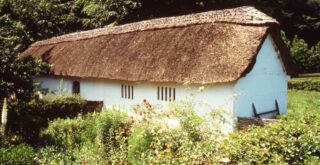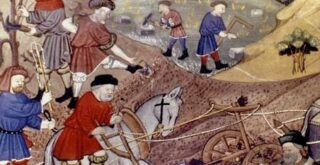Origins
The line of Mortimers at Witheridge began with Joseph Mortimore of Witheridge (c.1722-1794). He was presumably born somewhere nearby but no baptism record has been found for him. The family does not appear to have any relationship with the Mortimer alias Tanner family of Witheridge, who by this time had dropped the name Mortimer. It is more likely that Joseph was connected with the Mortimers at Lapford or Morchard Bishop, who later moved to Chulmleigh and Thelbridge. He was perhaps born in the nearby parish of East Worlington, as John Mortimer was living there in 1723, when he signed the Oath of Loyalty. The matter is complicated by the fact there are no surviving wills of the family. None of them seemed to own any land, and it seems unlikely that they had any personal wealth.
Joseph Mortimer (c.1722-1794)
Joseph married Elizabeth Vaughan, 25 Apr 1749 Witheridge. Elizabeth’s family can be traced back only a few generations before this date. Vaughan is a traditional Welsh name and derives from the personal name of Fychan or Vychan, so perhaps the Devonshire Vaughans were originally from Wales. In medieval times, the West Country, in particular Cornwall had a strong connection with Wales, and there was substantial cross migration between the two regions. This is attested by the prominence of Welsh names in Cornwall such as Morgan and Parry. Joseph Mortimer’s occupation is unknown. It seems likely that he was either a weaver or an agricultural labourer, going by the occupations of his descendants.
Joseph and Elizabeth had the following children:
1. Elizabeth 1750-1800
2. Joseph Mortimer II
3. Mary 1755-1833
4. John Mortimer 1757-1828
5. James Mortimer 1760-1825, who married Ann Davy (1763-1847), 29 Mar 1784 Thelbridge, and had the following daughters. In 1787 he was a day labourer (ag lab), and was in receipt of parish relief in 1792.
i. Grace 1784-1849
ii. Ann 1787-1838
iii. Elizabeth 1789
iv. Sarah 1792
6. George Mortimer 1764-1847, who married Agnes Long (1773-1847), 22 Oct 1792 Witheridge and had the following children. He was bur. 5 Dec 1847 Witheridge, aged 83.
i. Agnes 1793
ii. Mary 1795-1867
iii. Sarah 1798
iv. George Mortimer II 1800-1872
v. Elizabeth? Mortimer of Morchard Bishop c.1803, who was born in Witheridge but whose baptism doesn’t seem to have been entered. Since there is a gap in young Mortimer children between 1800-1808, perhaps Elizabeth was a daughter of George Mortimer.
vi. Susanna 1808
vii. Joseph Mortimer 1810
viii. John Mortimer 1813-1814
ix. Ann 1815
Joseph Mortimer (1753-1838)
Joseph was bapt. 22 Jan 1753 Witheridge. He married Barbara Kingdon (1753-1833) 9 Dec 1776 Witheridge. They had the following children. He was bur. 30 Sep 1838 Witheridge, aged 85.
1. Agnes 1777-1861
2. Joseph Mortimer III
3. James Mortimer 1782-1848
4. William Mortimer 1784
5. Joan Mortimer 1787
6. George Mortimer 1789-1873, who m. Elizabeth Arscott, 1820 Chittlehampton. They had a son:
i. John Mortimer 1824-1907, who emigrated from Devon to the United States.
Joseph Mortimer (1779-1851)
Joseph was the eldest son of Joseph Mortimer and Barbara his wife. He was baptised 5 Sep 1779. He learned the ways of an agricultural labourer, before his first marriage. He married firstly Betty Girney (c.1777-1804) 3 Jun 1799 Witheridge.
At this time, the Napoleonic Wars were in full swing. He joined the Devon and Cornwall militia, later enlisting with the 32nd foot soldiers, Cornwall Regiment as a private. Joseph’s military career, whilst not exceptional, was certainly eventful, and so is certainly worth reproducing in the following paragraphs. In 1803 he was sent to Ireland to help quell the Irish rebellion. The following year, his wife Elizabeth died, but Joseph did not immediately remarry. In 1807, the Regiment was sent abroad again, this time to Denmark. Joseph saw action in the Battle of Copenhagen, when the regiment took control of captured Danish ships. A year later, the regiment joined the major British war effort, in the Peninsula War, Portugal. Joseph fought in the Battle of Rolica, Battle of Vimeiro, and the Battle of Corunna.
In August 1809, the regiment moved north to participate in the Walcheren Campaign, the Netherlands. Joseph managed to survive the deadly sickness known as Walcheren fever. After being reinforced, the Regiment returned to Spain. Joseph fought in the Battle of Salamanca and the Battle of the Pyrenees, as the British forced the French north out of Spain.
The Regiment then joined the pursuit of the French forces into France. By then a seasoned soldier with over ten years of military experience, Joseph fought in the Battle of Nivelle, Battle of Nive and Battle of Orthez.
The war came to a resolution in Belgium two years later. In June 1815, the Regiment arrived at Quatre Bras just in time to halt the French advance. Two days later, Joseph fought in the Battle of Waterloo, when the regiment stood its ground against the main French attack. Later that year, Joseph was awarded the Peninsular medal, having been attested for all the eight major battles of the Peninsular War. In recognition of his services at Waterloo, Joseph was also awarded the Waterloo medal.
Joseph Mortimer was finally discharged from the army in 1819, after twenty years service, in which time he had also achieved the rank of Corporal. He returned to Witheridge, Devon, as a decorated War hero. He married for the second time, to Mary Crocker, a woman over twenty years his junior. They wedded 4 Apr 1821, in Witheridge. Fortunately both of Joseph’s parents were still living at the time, and it is likely they both attended the wedding. Joseph and Mary had the following children:
1. James Mortimer of Plymouth (c.1822-1883), who following in his father’s military footsteps and joined the navy. He relocated to Plymouth, then Tavistock.
2. George Mortimer 1824
3. Ann 1830
4. Mary 1833-1836
5. Maria 1835
6. William Mortimer 1838-1924, who was doubtless one of very few people living in the 1920s who could say their father fought in the Napoleonic Wars.
Currently, the Mortimers of Witheridge are still represented in the main line in the UK, by a branch of the family living in Wales.
Explore the pedigrees of other related Mortimer families:
